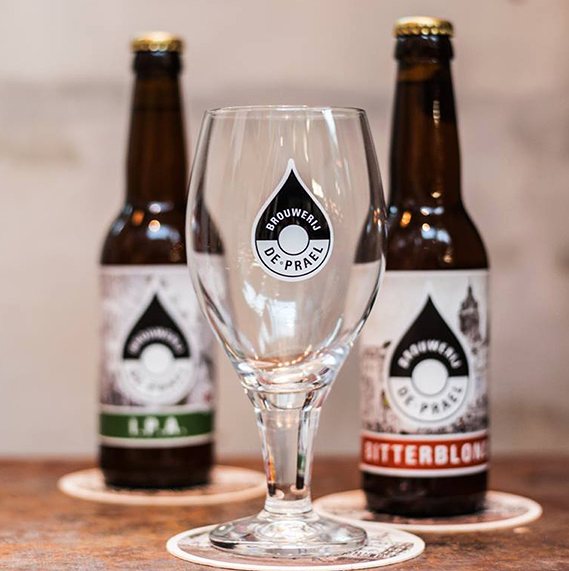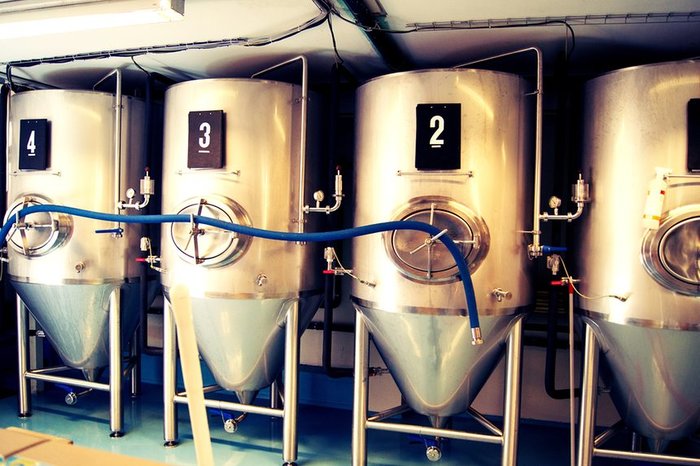A group of Dutch entrepreneurs has used their country’s wet weather as a business opportunity by creating a rainwater bitter.
It may have been the wettest June since records began in some of the Netherlands, but that’s no reason for the Dutch to be despondent.
A small group of entrepreneurs has demonstrated that it’s the perfect excuse to make beer, launching a brew made from rainwater.
The idea is that with climate change linked to increased rainfall in the Netherlands – just as in the UK – they might as well use it as a business opportunity.
At the De Prael brewery in Amsterdam early on Friday evening, bitter lovers turned up for a free tasting of Hemelswater: code blond, a 5.7% beer made from ultra-filtered rain, organic malted barley and wheat, hops and yeast.
“It’s a bitter blond, like an IPA,” explains Hemelswater (which means heaven’s water in Dutch) co-founder Joris Hoebe, “It’s quite bitter, fruity and soft.”

The social entrepreneur and student coach got involved in this project, inspired by a government spin-off called Amsterdam Rainproof. This body aims to make citizens aware of the problems of heavy rainfall and take action (pdf) to increase the city’s sponge capacity, so that rainwater is absorbed or used instead of causing flash-floods.
“We get lousy summers and a lot of rain,” says 37-year-old Hoebe. “As a hobby, I was also brewing beer and noticed you need a lot of water. I was thinking, why don’t we put these two together: the abundance of rainwater and the need for water to brew beer?”
Obligingly, May brought two weekends of heavy rain and the team managed to push 1,000 litres of rainwater to De Prael brewery in central Amsterdam, which had agreed to be their partner.
Using a special bacterial filtration system also called Hemelswater, they filtered the beer and handed it over to be boiled and made into the brewery’s simplest beer.
The brew is currently on sale for around €2 (£1.70) a bottle, and will be served on tap at various restaurants and bars around the Dutch capital (for around €4 or £3.40).
“In the next year, we want to scale up with hundreds of these tanks across the city, on [the roof space of] companies, restaurants and cafes,” says Hoebe. “We want them to catch the water, we’ll put in sensors and when their tanks are full, we’ll collect the water with electric cars and filter it. We are thinking about making beer, sorbet, soup and lemonade.”
There is a precedent, he adds. “It seems like a disruptive idea, but when we researched it, in the middle ages, [Dutch] breweries set up near churches and cathedrals to catch rainwater runoff from their roofs.
People may worry that about the cleanliness of rainwater, but Hoebe says “you boil the beer so bacteria are killed. There are a lot of problems with drinking water, with more drugs and hormones [found in it]. We believe that with rainwater, we can make cleaner beer.”
De Prael liked the sound of the project from the start, says marketing manager Thomas Gesink. Founded 13 years ago, the Amsterdam brewery employs people facing difficulties in getting a job, training them in the art of making beer (with some support from social funds).
It is set to expand to a second site, and is planning a rainwater tank for the roof to make more code blond beer – whose name is inspired by Dutch color-coded weather warnings.
“We have this goal to contribute to a better society, and we like to use and make products that are good for the environment,” says Gesink. “The idea is to have cafes catch their own water that we use to make their beer.”
Daniel Goedbloed, program manager at Amsterdam Rainproof, said the body was created by the Dutch water infrastructure organization Waternet in response to a disastrous 2011 cloudburst in Copenhagen, which saw six inches of rainfall in less than three hours causing £688m of damage. “They thought how vulnerable Amsterdam is with all its canals,” he explains.
His group gives commissions to small projects, encourages people to create rain-friendly gardens and green roofs, and lobbies larger building projects to incorporate rainwater gathering.
A new island in the IJburg artificial island chain in Amsterdam, for instance, is now being rainproofed, and Mirandabad swimming pool has a parking area on large plastic crates of gravel, so rainwater drains through quickly.
There are government grants to make green roofs and Amsterdam Rainproof is working with other organizations to encourage crowdfunding.
“Rain beer is great,” said Goedbloed. “We say every drop counts, and don’t just look at the down sides. Look at the fact that you can use rainwater to green the city and make it more attractive or even flush your toilet. Hemelswater uses rainwater to make a really nice product: beer. It’s fun, and a lot of people drink beer.”
Source: The Guardian
Women of Green is TURNING UP THE VOLUME of the feminine voice on the planet in order to create the world we know is possible.
